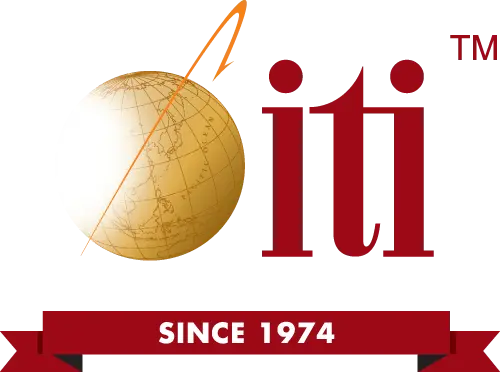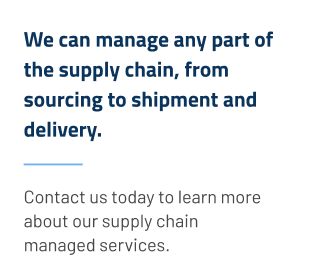
We’ve always liked the old adage that it takes a village to raise a child. This phrase carries a certain gravity to it, suggesting that it takes the collective will of many to give the best possible chances of prosperity to one.
It’s a fitting analogy to business, reminding us that just like with one child, one organization needs the support of many others to have any chance of long-term success.
A great example of this can be found in industrial supply chains – a network of specialized businesses working together to create and deliver your product.
Just like a village, each business in the supply chain handles a small portion of the overall effort that fits with their strengths, the sum of which is a viable product that couldn’t have been made (as well or at all) otherwise.
The Many Benefits of Supply Chain Outsourcing
Outsourcing parts of your supply chain can offer significant advantages, such as:
1. Focus on Your Strengths
Outsourcing portions of your business operations to an external entity frees up your company to focus on what you do best, all while cutting costs, reducing resource demands, and improving effectiveness. Manufacturers can outsource production steps so that their core team can strategically focus on product development and revenue-generating activities.
2. Streamline Work Processes
Specialized suppliers are experts at their craft, typically offering more efficient production workflows with shorter production times, less waste, and higher resource utilization. Domestic manufacturers could certainly achieve such efficiencies themselves over time, but outsourcing to suppliers that are already operating at these levels can bring about such benefits much quicker and at substantially lower costs.
3. Manage and Delegate Risk
Many manufacturers practice outsourcing as a risk mitigation strategy, spreading responsibility to outside suppliers who are more qualified and less susceptible to risk factors than they are. For example, outsourcing primary production steps to an overseas producer can make that company responsible for all of the associated work steps involved with securing and storing volatile raw materials.
4. Leverage External Specializations
Many manufacturers start out as jack-of-all-trades, but as they find success and scale up, they hit a point where certain underdeveloped aspects of the business will be too costly or painful to optimize. Outsourcing offers a solution, as a manufacturer can engage external suppliers already established and specialized in the needed key technologies, tool processes, knowledge work, or talent.
5. Balance CapEx and OpEx Demands
Leveraging external specialized suppliers directly cuts the need for the manufacturer to commit capital expenditure (CapEx) dollars towards developing these skill sets themselves. Not only can these funds be saved, but smaller portions of these cash flows can be spent on critical operating expenditures (OpEx) such as staff hiring, research and development, and sales activities.
6. Build Competitive Partnerships
When manufacturers and suppliers align both in mindset and technical capabilities, magic can happen. As manufacturer-supplier relationships evolve, both parties become increasingly invested in protecting and promoting their partnership through mutual investment (barring any performance or cost concerns). At their peak, such relationships can produce compelling competitive differentiators, such as brand recognition for the supplier and long-term cost stability for the manufacturer.
7. Diversify Channels for Resilience
As another risk mitigation tool, companies can benefit greatly from expanding their supplier pool through outsourcing. Diversifying suppliers provides multiple channels that a manufacturer can utilize across their production chain, ensuring that operations continue on smoothly should any single node in the chain falter.
8. Break Into New Markets
Manufacturers often wish to push their products into new markets, but are faced with substantial logistics, regulatory, distribution, and brand recognition challenges in doing so. Instead of making a direct sales push, a manufacturer can outsource production to a foreign supplier, which inadvertently places their products in that region. Through the local supplier, the manufacturer now gains a local presence and the commercial and regulatory compliance benefits carried by the supplier.
9. Tap Into Government Incentives
Outsourcing can provide financial benefits through government channels in the forms of tax breaks, incentives, and subsidies. Such incentives are usually offered by foreign governments to attract export investments, whereas local governments tend to disincentivize domestic companies from outsourcing away from their own country (such as with the US’ No Tax Breaks for Outsourcing Act). Despite these competing interests, manufacturers can often get local and foreign incentives to line up, providing a net benefit.
10. Optimize Cost Profiles
Last but not least, manufacturers can use outsourcing as a viable cost control lever. Outsourced production provides flexibility that would not be possible if the manufacturer were to directly own and operate those parts of their supply chain. In this way, manufacturers can scale their supply chain up or down, avoiding high fixed costs and granting much greater control over cost profiles should the need to quickly pivot arise.
Evaluating Your Supply Chain for Outsourcing Opportunities
While we have other articles dedicated to the topic of evaluating a business for outsourcing opportunities, we want to briefly cover three points that must always be considered alongside the benefits of outsourcing. Too often, outsourcing might look like a no-brainer on paper but can present undue risk that is not immediately obvious.
To help avoid such a predicament, we encourage manufacturers to consider the following:
Compare Costs using a Detailed Cost Model
Evaluating the true total costs of foreign suppliers can be challenging not only given the natural difference in business practices between countries, but more so when estimating external cost influences that come into play. A detailed cost model can help shed light on the true cost value or detriment that a foreign supplier brings, accounting for things such as currency conversion rates, hidden or pass-through logistics costs, taxes, import levies, intermediate handling costs, insurance, payment bonds, and more.
Think Long- and Even Longer-Term
For anything beyond a one-time commodity transaction, outsourcing engagements should be treated as lasting commercial investments. When considering outsourcing options, manufacturers should consider long-term implications such as government policies, trade wars, geopolitical stability, economic factors (namely labor costs), exchange rates, and any other factors that may make their investment less appetizing. Take the current state of Chinese trade for example – global manufacturers flocked into China in the 1990s only to now scramble out of China due to their changed political and economic attitudes.
Get Boots on the Ground
No matter how informed a domestic manufacturer is about a foreign culture and industry, they will never possess the intimate, first-hand insight that local experts will have. For this reason, manufacturers are wise to engage local support – either directly or through agent visits – that can provide guidance about local regulatory conditions, commercial expectations, cultural nuances, labor conditions, quality and technical metrics, and all the other elements that can be misrepresented across the distance. Having good hands-on representation is paramount not just when establishing outsourced supplier relationships, but also throughout the course of an engagement.
Ready to Explore Outsourcing your Supply Chain?
ITI Manufacturing connects customers and manufacturers across three continents to bring your product to life. We specialize in industrial manufacturing for a wide range of industries and materials, including medical devices, electronics, consumer goods, and more. With 50 years of experience, we handle your project from concept to delivery. Contact us today to discuss your manufacturing needs.





